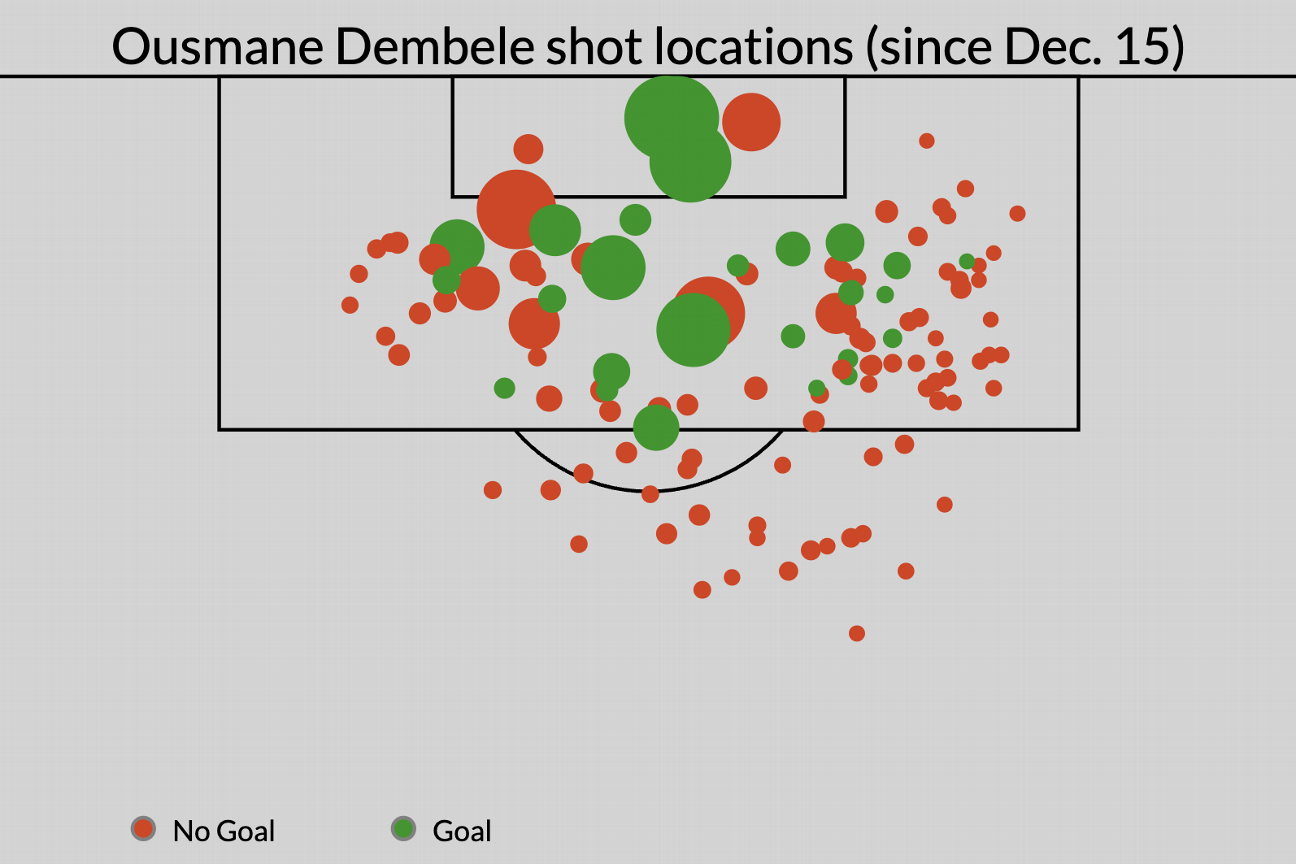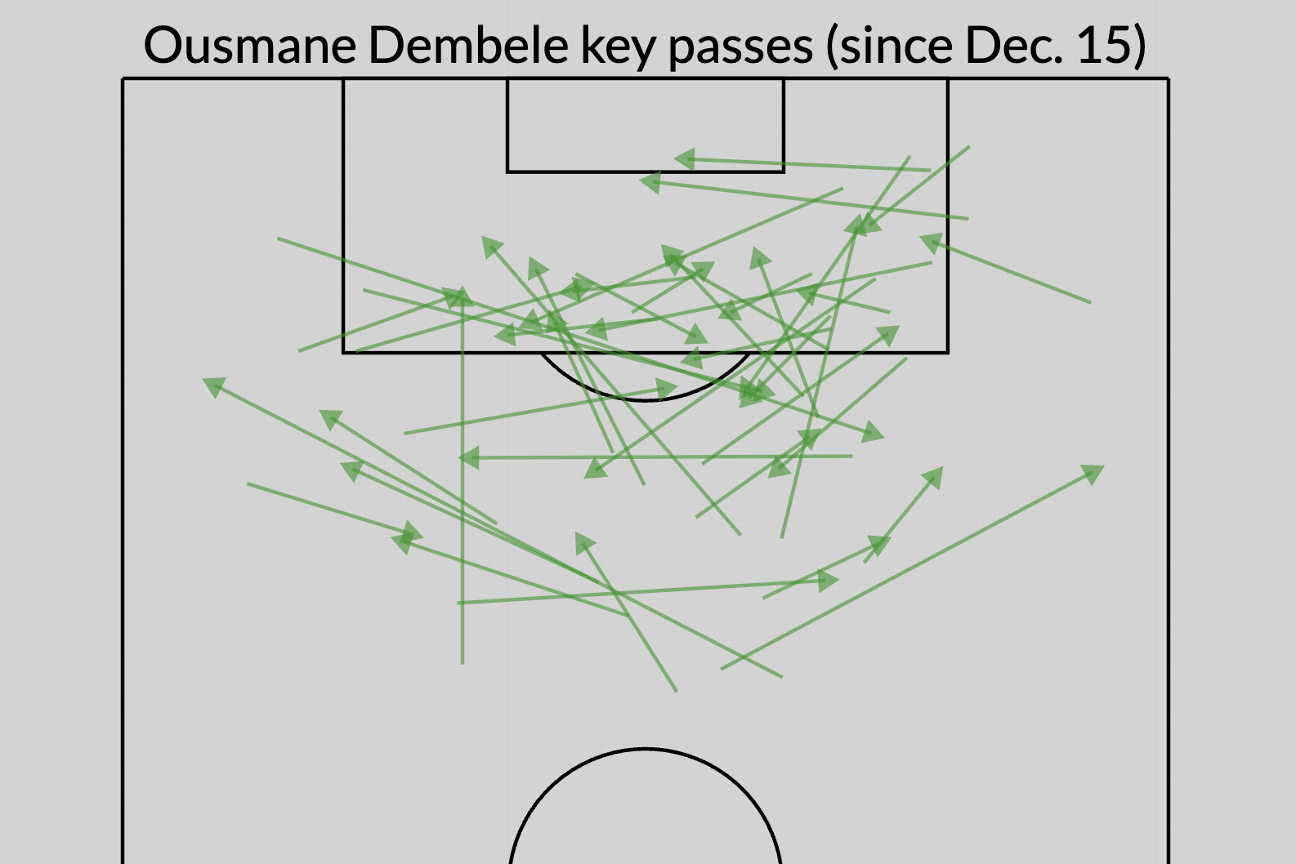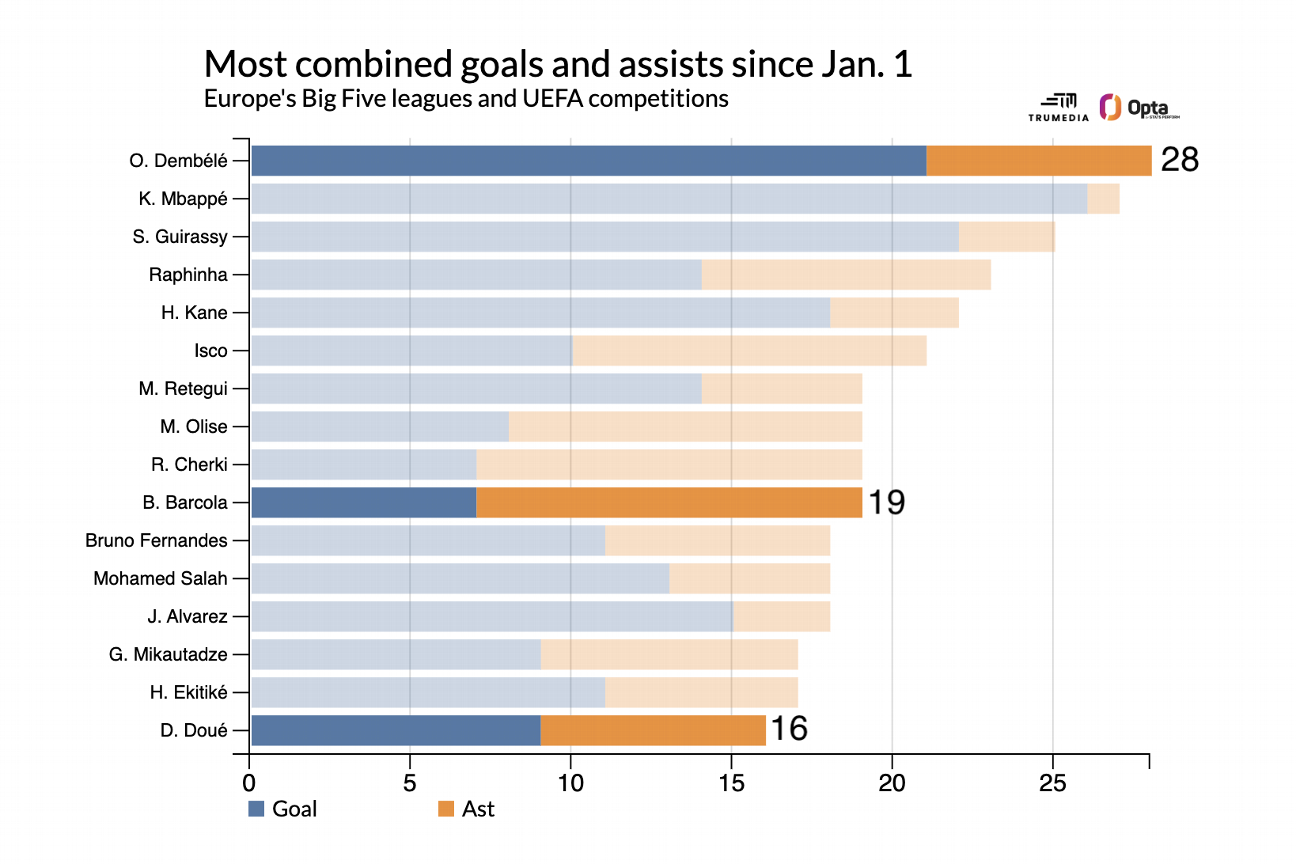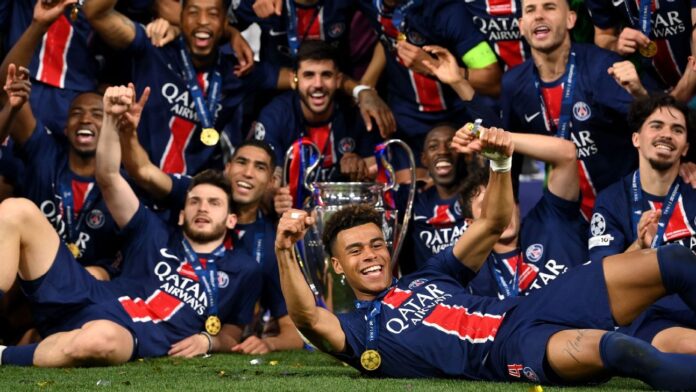When Qatar Sports Investments (QSI) became Paris Saint-Germain‘s majority owner in 2011, the club was Europe’s 48th-best team, according to the numbers at EloFootball.com. And this was a major improvement — they were 90th a year earlier.
They had just finished fourth in Ligue 1, their best placement in more than a decade. They had fallen to Benfica in the UEFA Europa League round of 16, and it was encouraging. At this moment in the summer of 2011, PSG were a VfB Stuttgart (tied with PSG for 48th at EloFootball) or a Werder Bremen (41st) — a club with a proud and intense fan base, and no major history of success.
Fourteen years later, they are European champions. They won their first UEFA Champions League title — and became only the second French club to do so — with a jarring 5-0 statement win over Inter Milan in Munich on Saturday. It might have been the best performance ever in a Champions League final, and it gave them as many European titles as Manchester City, among others.
Saturday’s win was the culmination of a more than decade-long story of lavish spending and heartbreak and missteps and all the things that modern soccer exhaustingly forces us to think about at all times (sportswashing, legal fights, nation-states, geopolitics). It also provided us with a chance to look back at the twists and turns that got PSG to this point.
Their rise was very fast, then very slow. How did they fall short in the past? What made this year different?
A fast rise, followed by stagnation
2011-12 season
Manager: Antoine Kombouaré, then Carlo Ancelotti
Ligue 1 finish: 2nd
Europe: Europa League group stage
EloFootball end-of-year rank: 28th
The plan at first seemed pretty simple: Spend big on transfer splashes — their first big acquisition was Palermo’s Javier Pastore for €42 million, followed by Inter’s Thiago Motta in January — and hire the most brand-name manager you can find. Ancelotti came aboard after a fall funk in domestic play and a frustrating group-stage exit in the Europa League. PSG lost just two of their last 23 league matches and finished just three points behind surprise champions Montpellier. It was quickly clear where things were headed.
2012-13 season
Manager: Carlo Ancelotti
Ligue 1 finish: 1st
Europe: Champions League quarterfinals (lost to Barcelona, 3-3 on away goals)
EloFootball end-of-year rank: 8th
The star power increased significantly in Year 2. PSG added AC Milan‘s Zlatan Ibrahimovic and Thiago Silva, Napoli‘s Ezequiel Lavezzi and rising teenage midfielder Marco Verratti in Summer 2012, then added 37-year-old David Beckham and Brazilian 20-year-old Lucas Moura the following January. They won Ligue 1 by 12 points and lost only once in 10 Champions League matches. They led Barcelona in the second leg of the quarterfinals, too, but a 71st-minute goal from Pedro eventually resulted in their demise. Although they had won Ligue 1 in 1986 and taken the UEFA Cup Winners’ Cup in 1996, this was the all-around best season in club history — good enough that Ancelotti was hired away by Real Madrid that summer.
2013-14 season
Manager: Laurent Blanc
Ligue 1 finish: 1st
Europe: Champions League quarterfinals (lost to Chelsea, 3-3 on away goals)
EloFootball end-of-year rank: 8th
PSG hired former France national team manager Laurent Blanc upon Ancelotti’s departure, then spent big on a couple more Serie A stars: Napoli’s Edinson Cavani and AS Roma‘s 19-year-old Marquinhos. Cavani and Ibrahimovic combined for 42 league goals, and PSG improved by six points to 89 in Ligue 1 play, but after some big Champions League victories (3-0 over Benfica, 5-0 over Anderlecht, 6-1 on aggregate over Bayer Leverkusen in the round of 16) and a 3-1 victory over Chelsea in the first leg of the quarterfinals, they collapsed, allowing a late goal to Demba Ba in the second leg and again falling via the away-goals rule.
2014-15 season
Manager: Laurent Blanc
Ligue 1 finish: 1st
Europe: Champions League quarterfinals (lost to Barcelona, 5-1)
EloFootball end-of-year rank: 8th
After a relatively quiet summer — Chelsea’s David Luiz was the only major addition, while teenager and future star Kingsley Coman was allowed to leave on a free transfer — PSG suffered a relatively slow start and were seven points behind league-leading Lyon in mid-January. They charged back to win a domestic quadruple (Ligue 1, Coupe de France, Coupe de la Ligue and Trophée des Champions) but got run over by Luis Enrique’s all-time great Barcelona team in the Champions League. It was a third straight quarterfinal defeat, although from a branding perspective, growth was continuing: They rose to fourth in the Deloitte Money League with €481 million in revenue in 2014-15.
2015-16 season
Manager: Laurent Blanc
Ligue 1 finish: 1st
Europe: Champions League quarterfinals (lost to Manchester City, 3-2)
EloFootball end-of-year rank: 5th
PSG took another Premier League star in the summer of 2015, adding Manchester United winger Ángel Di María to the squad (and letting another future star, 20-year-old goalkeeper Mike Maignan, leave). He was a perfect talisman, creating 18 assists, more than half of which went to Ibrahimovic (38 league goals) or Cavani (19). PSG rolled to 96 points in league play, 31 more than second-place Lyon, and won another domestic quadruple. But they fell for a fourth straight season in the Champions League quarterfinals. PSG president Nasser Al-Khelaifi publicly called the season a failure, and PSG and Blanc parted ways after three ridiculously successful seasons. Ibrahimovic and Luiz left, too.
2016-17 season
Manager: Unai Emery
Ligue 1 finish: 2nd
Europe: Champions League round of 16 (lost to Barcelona, 6-5)
EloFootball end-of-year rank: 5th
The sixth season of the QSI experiment was a major inflection point. On the pitch, things turned dire by PSG’s new standards. Cavani enjoyed a huge season in Ibrahimovic’s absence, but an AS Monaco team led by Radamel Falcao, Bernardo Silva and 17-year-old Kylian Mbappé charged to 95 points and ended PSG’s four-year Ligue 1 title streak. Meanwhile, after a stolid group-stage performance, PSG were paired with Barcelona in the Champions League round of 16. It was the third time in five years that they met Barça in the knockout rounds, and a cathartic 4-0 win in the first leg suggested PSG were about to turn a corner.
But then came La Remontada.
2017-18 season
Manager: Unai Emery
Ligue 1 finish: 1st
Europe: Champions League round of 16 (lost to Real Madrid, 5-2)
EloFootball end-of-year rank: 6th
1:02
PSG fans flood the streets of Paris to celebrate UCL title
PSG fans take to the streets of Paris after their side are crowned Champions League winners with a 5-0 win over Inter Milan.
Barcelona’s 6-1 win in the second leg of the 2016-17 Champions League round of 16 was one of soccer’s most thrilling matches. It also ended up changing the sport when a desperate, wounded PSG completely reset the transfer market, laying down €222 million to acquire Neymar, the primary architect of La Remontada, from Barcelona. They arranged a €180 million deal for Mbappé, too. The shock-and-awe moves forced Barça into a run of panicked and foolish spending that would render them European afterthoughts in the coming seasons, but the signings only helped PSG so much at first. They romped through Ligue 1 and won another domestic quadruple, but after taking an early lead over Real Madrid in the Champions League round of 16, they allowed four straight goals and fell in meek fashion. That was enough to send Emery packing.
2018-19 season
Manager: Thomas Tuchel
Ligue 1 finish: 1st
Europe: Champions League round of 16 (lost to Manchester United, 3-3 on away goals)
EloFootball end-of-year rank: 8th
By this point, big spending and star power had made PSG a genuinely enormous brand. As Tom Williams put it in “Va-Va-Voom: The Modern History of French Football,” “A year after the [Neymar’s and Mbappe’s] arrival and following on from Mbappé’s star turn at the 2018 World Cup, the club announced an exclusive three-year partnership with Nike subsidiary Air Jordan, moving Al-Khelaifi to proclaim that PSG were now ‘one of the three biggest football brands in the world.’ PSG opened offices in Shanghai, Singapore and New York. A-listers like Leonardo DiCaprio, Mick Jagger, Rihanna, Kim Kardashian and Selena Gomez took in games at the Parc des Princes. Beyoncé popped up on Instagram wearing a PSG shirt embroidered with Swarovski crystals, teenagers clamored for club-branded merchandise from Toronto to Tokyo. No French club had ever been so visible, so glamorous, so cool. And yet on the pitch, PSG would become a laughing stock.”
Falling year after year to European bluebloods like Barça and Real Madrid was one thing, but in the spring of 2019, PSG lost to a flailing and banged-up Manchester United team after winning 2-0 at Old Trafford in the first leg. Two goals from Romelu Lukaku and a late penalty by Marcus Rashford sealed another collapse. PSG lost in the Coupe de France and Coupe de la Ligue, too.
2019-20 season
Manager: Thomas Tuchel
Ligue 1 finish: 1st
Europe: Champions League finals (lost to Bayern Munich, 1-0)
EloFootball end-of-year rank: 3rd
After basically trading bright, young potential stars like Christopher Nkunku (RB Leipzig) and Moussa Diaby (Bayer Leverkusen) for veterans like Idrissa Gueye (Everton) and Keylor Navas (Real Madrid), PSG took a solid step forward in Tuchel’s second season. They were on pace for 96 points when COVID-19 ended the Ligue 1 campaign, and in the abbreviated (and crowd-less) Champions League knockout rounds, they pulled off comebacks against Borussia Dortmund and Atalanta. But former PSG youngster Coman scored for Bayern in the 59th minute of the final. This was the most successful season yet for the new PSG, but they fell just short of European glory.
2020-21 season
Manager: Thomas Tuchel, then Mauricio Pochettino
Ligue 1 finish: 2nd
Europe: Champions League semifinals (lost to Manchester City, 4-1)
EloFootball end-of-year rank: 4th
Getting that close to glory didn’t earn Tuchel any favors. A bumpy start to the 2020-21 campaign — four losses in league play, two in the Champions League group stage — meant he was ousted in December. Pochettino produced a bit of an energy boost in the new year, and PSG seemingly exorcized a couple of demons with wins over a flagging Barcelona and defending champion Bayern Munich in the Champions League knockouts, but PSG were picked apart by Manchester City in the semis.
2021-22 season
Manager: Mauricio Pochettino
Ligue 1 finish: 1st
Europe: Champions League round of 16 (lost to Real Madrid, 3-2)
EloFootball end-of-year rank: 7th
The summer of 2021 ended up transformative in a couple of different ways. Long term, PSG brought in a trio of youngsters that would become major building blocks for the eventual championship team of 2025, landing 22-year-old right back Achraf Hakimi, 19-year-old left back Nuno Mendes (Sporting CP) and 22-year-old goalkeeper Gianluigi Donnarumma (AC Milan). But in the short term, they made their biggest ever move, plucking away Lionel Messi when Barcelona, cash strapped from years of reckless spending following Neymar’s departure, couldn’t afford to keep him. They also brought in veteran former Champions League winners Sergio Ramos and Georginio Wijnaldum. They were clearly all-in for 2021-22.
Instead, they won one trophy. They easily won Ligue 1, but with Messi seeming only half engaged and Neymar missing almost half the season to injury (not exactly unusual at that point), they bowed out quietly against Real Madrid, again watching an early lead disappear.
“The secret against PSG is to press them,” Real Madrid’s Karim Benzema told L’Equipe. “The matches they’ve lost in Ligue 1 are the ones where they’re being pressed from all sides. And then when we scored, they told themselves they’d lost the game. … That often happens to them, they give up mentally.”
Ouch.
2022-23 season
Manager: Christophe Galtier
Ligue 1 finish: 1st
Europe: Champions League round of 16 (lost to Bayern Munich, 3-0)
EloFootball end-of-year rank: 15th
While PSG continued to compile key, future pieces — 22-year old midfielder Vitinha came aboard from FC Porto, while 16-year-old academy graduate Warren Zaïre-Emery found a place in the rotation — new manager Christophe Galtier ran into the same issues Pochettino battled: With Mbappé, Neymar and Messi up front, PSG had no forward willing to press. In the modern game, that creates an imbalance that is hard to overcome. The star power and a combined 58 goals and 32 assists from the attacking trio produced another easy league title. Meanwhile, the shortcomings produced a surprising second-place finish in the Champions League group stage and another meek knockout-round defeat, this time to Bayern.
It was once again time to start over: Galtier was dismissed, Neymar left for Saudi Arabia and Messi left for Miami. This was completely Mbappé’s team … for a moment, anyway.
2023-24 season
Manager: Luis Enrique
Ligue 1 finish: 1st
Europe: Champions League semifinals (lost to Borussia Dortmund, 2-0)
EloFootball end-of-year rank: 7th
In the summer of 2023 came clear evidence of a strategic shift. PSG had let too many French players find stardom elsewhere and had gone too far in choosing star power over team building. In came Frenchmen like left back Lucas Hernández, winger Ousmane Dembélé (who had been signed by Barça in the Neymar aftermath), forward Randal Kolo Muani and young attacker Bradley Barcola. In, too, came Luis Enqrique, Barça’s manager for La Remontada.
Still unable to get Mbappé to press, Luis Enrique wasn’t able to fully revolutionize PSG from a tactical standpoint, but after a bumpy autumn, PSG were outstanding in the spring. They pulled a lower-case remontada of their own against Barcelona in the Champions League quarterfinals, coming back from two goals down on aggregate to advance, 6-4, but they were beset by poor fortune in the semifinals: Despite attempting 44 shots to Borussia Dortmund’s 20 and generating 4.9 xG to BVB’s 2.6, they somehow fell, 2-0, on aggregate. They still won every domestic trophy, but Champions League regret was soon paired with the loss of Mbappé to eventual Champions League winners Real Madrid.
1:13
How PSG won the Champions League without Kylian Mbappe
ESPN FC’s Stewart Robson explain how PSG managed to win their first Champions League trophy without Kylian Mbappe.
What made 2024-25 different
To be sure, success, as originally envisioned by Al-Khelaifi and QSI, had already been half achieved heading into 2024-25. PSG had indeed become one of the biggest brands in the world, as evidenced by their move up to third on the Deloitte list, behind only Real Madrid and Barcelona, in 2022-23. They had the Nike partnership, and they had all the shirt sales they could possibly have hoped for.
They had won a ridiculous number of domestic trophies, too, but the one trophy that had eluded them didn’t really look like it was any closer to their grasp heading into 2024-25. They had begun to look like a genuine Luis Enrique side late in 2023-24, and their semifinal exit in the Champions League was genuinely unlucky, but losing Mbappé was seen as a major setback for obvious reasons.
PSG stuck to the plan, however. After adding pressing forward Gonçalo Ramos in January 2024, the club continued to aim young, adding teenagers Désiré Doué (Stade Rennais) and João Neves (Benfica) and 22-year-old defender Willian Pacho (Eintracht Frankfurt). And in January, they finally completed a lengthy pursuit of Napoli winger Khvicha Kvaratskhelia.
Even with the recent Kolo Muani transfer failing to generate traction (he was loaned to Juventus in January), PSG were sitting on a bounty of young talent, and Luis Enrique knew what to do with it. Eventually.
In a 12-match run from Oct. 1 into early December, PSG suffered four draws and three losses — all in Champions League play — and found themselves in a precarious position in the new Champions League league phase. They were in 25th place out of 36 teams with three matches remaining. (Only the top 24 advance to the knockout rounds.) Starting with a 3-0 romp at RB Salzburg on Dec. 10, however, everything began to click into place.
Luis Enrique’s post-Mbappé building process unfolded, step by step. As a source told ESPN, “[He] knew after the departure of Mbappé that he had a lot of work to make this team play as a team. So he had a few axes of work, and would only move to the next one once he had taught one to the players. They started with the pressing. Once they had mastered that, it was the counter pressing. Then Hakimi’s position, and then Nuno Mendes’ position as left back: [He would function as] half a third center back in possession, half a No. 8 in the left half-space. Then Dembélé’s position change … He did this until they were exactly the team he wanted them to be.”
In retrospect, subtle statistical shifts signify a huge difference.
PSG allowed just 44.1 progressive carries per match in the Champions League knockout rounds, easily the lowest they’ve allowed in the competition. That’s a clear sign of their improved pressing abilities. Meanwhile, they averaged 18.6 shots per 90 minutes in the knockouts, a higher total than they ever averaged with Mbappé, Neymar, Messi & Co. They could attack however the occasion warranted, with either long possession sequences or quick strikes: Their 4.1 direct attacks (sequences starting in the defending half and producing a shot within 20 seconds) and 3.1 shots from counterattacks were their highest ever knockout-round averages, but their 0.92 meters-per-second direct speed (the average distance the ball moves upfield in a given sequence) was also their lowest average.
They had every club in the proverbial bag.
This was a comprehensive turnaround, one that even the players themselves said began with a comeback win over Manchester City on Jan. 22. City themselves were attempting to work through their most fragile run of results in the Pep Guardiola era, and they took a 2-0 lead with two quick second-half goals. Starting with a Dembélé goal on a breakaway, however, PSG scored four goals in the final 35 minutes and stoppage time, attempting 18 shots to City’s two in the process. They ran City into the ground.
Over the next six weeks, they would add Kvaratshkelia and outscore 12 opponents by a combined 41-8. Then they drew Liverpool in the round of 16; after an unlucky 1-0 home defeat against the eventual Premier League champs, they responded with a win at Anfield and took the tie in penalties. They bolted to a 5-1 aggregate lead on Aston Villa in the quarterfinals, then withstood a late charge in a boisterous environment to advance. Dembélé scored in the fourth minute of the semifinal first leg at Arsenal, and they cruised 3-1 on aggregate. And then, having won every domestic trophy yet again, they humiliated Inter in the final.
The comeback against Manchester City was a great narrative device, but on paper, the turnaround had begun a month earlier. And it specifically began with surges from two key players in new roles.
With a more important role in Mbappé’s absence, Dembélé began the season in mediocre form. In his first 18 matches, he produced just five goals and four assists — zero and one, respectively, in four Champions League matches. In this span, 83% of his minutes came on the right wing. But starting with the win over RB Salzburg, he would play 82% of his minutes at center forward for the rest of the season. And as the focal point of the attack, he would suddenly turn into a Ballon d’Or candidate. Since Dec. 15, he has scored 27 goals with eight assists in 31 matches. He created a deluge of quality shot attempts for himself, and his side-to-side ball distribution proved equally vital.

(Source: TruMedia)

(Source: TruMedia)
Meanwhile, with Barcola struggling to make an impact in Champions League play — he had 10 goals and two assists in 14 Ligue 1 matches but zero and zero in the most important competition — Luis Enrique made a change to the lineup by giving Doué greater responsibilities.
Doué through Dec. 6: 17 games, 525 minutes (30.9 per appearance); zero goals, one assist; 0.45 xG+xA per 90 minutes
Doué since Dec. 16: 38 games, 2,424 minutes (63.8 per appearance); 15 goals, 13 assists; 0.74 xG+xA per 90 minutes
With eight combined goals and assists in 1,600 minutes at age 18 at Rennais last season, Doué was seen as an almost-surefire future star, but he hadn’t done much in Paris before Luis Enrique forced the issue and stuck him in the starting lineup. And with his ability to play on the right or left — important once Kvaratskhelia came aboard in January — he was an absolute game-changer in both attack and defense. Doué and Kvaratskhelia gave PSG a pair of tireless runners up front, Hakimi and Mendes had become the best fullback duo in the world, Vitinha shined as a pure ball-progression machine in the middle, Barcola thrived off the bench, and in his new role, Dembélé gave PSG the most prolific center forward in Europe in 2025.

(Source: TruMedia)
Aiming for pure star power and glamor helped PSG establish itself as a money-printing machine, but the club didn’t finally earn its greatest prize until it lost its biggest stars and learned to overwhelm opponents with depth, energy and a heaping dose of modern tactics.
Pulling off an encore performance tends to be even more difficult than the initial breakthrough. Luis Enrique knows this as well as anyone: Even with almost all of the requisite star power, his 2015-16 Barcelona team couldn’t match the heights of the all-time great 2014-15 squad that throttled PSG on the way to the Champions League title.
If he finds he needs to shake things up to avoid a hangover, though, he’ll have endless depth to pull from. Even while acknowledging that players like Dembélé (28), Hakimi (26), Vitinha (25) and Kvaratskhelia (24) are in no way old, it’s impossible not to notice just how many exciting young players PSG have at their disposal right now. Pacho (4,013 minutes in all competitions this year) and Ramos (1,612) are 23, Barcola (3,618) and Mendes (3,456) are 22, defender Beraldo (2,451) is 21, Joao Neves (3,692) is 20, and Doué (2,949) and Zaire-Emery (2,865) are 19. So, too, is midfielder Senny Mayulu, who played 1,068 minutes this year and scored one of the late goals on Saturday. And we haven’t even gotten to players like winger Ibrahim Mbaye (17), fullback Yoram Zague (19) or center backs Axel Tape (17) and Noham Kamara (18), each of whom played bit roles this season.
PSG slowly compiled the deepest and most frighteningly young roster on the planet. It is so young, in fact, that you could say it arrived ahead of schedule and might not peak for another year or two. It probably took longer than Al-Khelaifi & Co. expected for PSG to achieve the ultimate breakthrough — and there were certainly some devastating disappointments along the way — but now that they’ve made it here, they probably aren’t going anywhere for a while.

















